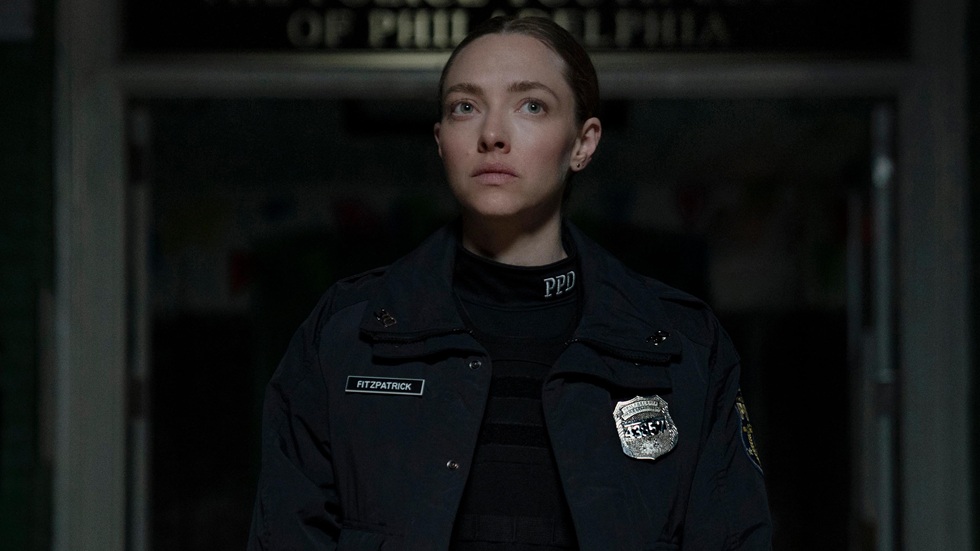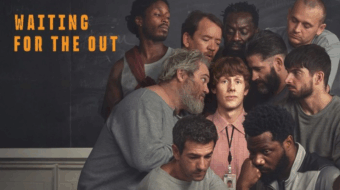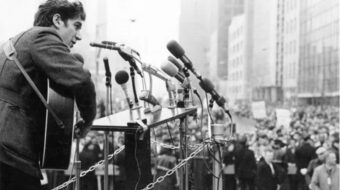
LILLE, France—There are some hits, some misses, and some mixed series coming audiences’ way this spring and for the rest of the year. This listing of the good, the bad, and the indifferent is a distillation of the 48 series from 19 countries screened recently at the largest TV festival in the world, Series Mania in Lille.
There is also, as Europe swings toward a wartime footing and braces for the inevitable cutting of social services, a distinctly ideological character to the choices and to the content of the series screened. Out for a larger degree than previously was criticism of the internal workings of European societies. It was labeling of their erstwhile enemies, foremost among them being Russia. The evil nation to the east showed up even in pitches for future series, including one about the aftermath of the 1980 sinking of the cruise ship Estonia, itself made into a series. The pitch proposed the dastardly villain being an elderly Russian woman who is killing her neighbors to recover diamonds stored inside a Russian doll.
Elsewhere, China is long overdue to have an entry in the festival, though the directors said this year, China came close. Once again, though its vibrant and huge television industry was not represented, instead Taiwan was chosen to be spotlighted, winding the clock back to Cold War days, where Taiwan was recognized in the West as the legitimate government of mainland China.
Two Israeli series were much in evidence, and both in a sense helped whitewash the ongoing tragedy in Gaza where the Israelis recently targeted and murdered the family of Fatima Hassouna, the photojournalist whose documentary had the day before been accepted in Cannes, with the killing clearly meant to keep her from walking the red carpet where she would have the global spotlight to talk about the now final (?) stages of the genocide.

The German, in its crosscutting of a wife in the ’70s on a kibbutz and a husband tracking an ex-Nazi, took us back to the “golden age” of Israeli society where the kibbutz was seen as a collectivist experiment, rather than today where it is closer to a Silicon Valley start-up and where tracking down the killers of World War II is regarded as a mission of justice by the Mossad, who have now simply become hardened killers. The other series, Menace Imminent or Imminent Threat, deals with a terrorist hijacking of a device from Israeli intelligence that can lock down any computer and is used in the opening scene to stall a car on a train track to assassinate a target as the train barrels through. It is suggested that the device has fallen into the wrong hands, rather than being safely ensconced with the Israeli army, where, of course a similar program was used to blow up pagers in Lebanon, where more than 3000 people were injured, many of them doctors, nurses and patients since pagers were often used for medical purposes, all of which questions how safe the program is in the hands of Israeli intelligence. The series cuts back and forth between Israel and France, with the action in Israel taking place entirely on a military base and suggesting the complete militarization of a society at war with most of its neighbors. Finally, there is a palpable air of menace that is sustained through both the increasingly tense story and the thumping music, which suggests that those in the society live each moment in a kind of constant state of alert and heightened tension. It is this heightened sense of danger that has allowed the Israelis to export suspense series, having participated in the creation of 24 and having seen Homeland adopted from an Israeli series. What the series, perhaps unwittingly, reveals is the heartbeat of a society unceasingly at war.
The best, the worst, and something in between
Hits
37 Seconds – Prized in the festival as the best French series, this ARTE or public television series winds the suspense ever tighter as a female friend of a relative of one of the six Breton fishermen drowned mysteriously in the English channel importunes a lawyer to investigate the sinking, which occurred in the 37 seconds of the title, and as the evidence starts to point to the presence in the area of either British or French military. The budding romance between the provincial schoolteacher bent on the truth and the Parisian lawyer who admires her steadfastness adds to the charm.

Log Out – Another French series, this time about a wife and mother whose husband dies in a mysterious explosion and who then must be a driver in a car service to make her living. She blocks out the tragedy until a man enters her lorry, whom she recognizes as the last person she saw before the house with her husband blew up. She then flees with her son. The intrigue is palpable as she is pursued by whoever planned the explosion but often the point of the series is how difficult it is, even if one’s life depends upon it, to escape the digital devices which track our every movement, that is, how impossible it is in today’s wired societies to literally or metaphorically log out.
Celeste – The improbable heroine of this Spanish series, played exquisitely by Almodóvar actress Carmen Machi, is a retiring tax auditor with a yen for a younger accountant in her office but who is called back to work to round up some government revenue on the Mexican pop singer of the title who spends more time in Spain than she lets on. The contrast is sharp between the two lifestyles, one of unlimited extravagance and the other of the tax investigator whose life is limited but who is fearless in her pursuit of securing the funds that help support Spain’s welfare state. Here’s hoping her next case is Elon Musk.
Long, Bright River – Oscar winner Amanda Seyfried stars in this series about a working-class Philadelphia cop who, on her beat of Kensington, because of her empathy for the street women based on her sister’s being a victim of the streets, is able to spot a serial killer which the rest of the force simply ignores. Yes, the series harks closely to Mare of Easton, which the reviewer in The Guardian complained about, but somebody needs to tell their critic it is possible to have more than one series about a working-class woman. The patrolwoman’s pursuit of the “long river” of opioid victims inevitably leads back to the police themselves. It is fascinating to see Seyfried, initially positioned in Hollywood as a seductive ingenue (Marion Davies in Mank), seize control of her career and instead fashion a complicated role that frees her of her patriarchal casting. Only qualm is that the series is heavily focused on Kensington’s Irish-American population when the neighborhood is now a good deal more diverse than represented here.
Misses

The Danish Woman – Huge disappointment from the Icelandic creators of Woman at War, a film about a true Wonder Woman who battles Icelandic energy companies. This bristly, cantankerous elderly character, whom we are supposed to regard as “impish,” is actually a former member of the Danish security forces who moves to Iceland and punishes her neighbors even as she commands them to “learn Danish.” Not sure what is so cute about a colonial, imperialist bully, even in the frame of an elderly woman. The producers are taken with the character, having her dance on the hillside in the intro and outro, but audiences may not be so enthralled.
Small Town, Big Story – The tired trope of a quirky small town is given yet another airing as the residents of a Northern Irish town, who include a doctor and his paraplegic wife who is shtupping her fellow grade-school teacher, are visited by a Hollywood producer and her film crew to determine in the pilot if their town will be chosen as site of a film. Quirkiness, like “whimsy” and “wit,” wears thin pretty quickly, and we are left with two huge blunders in the pilot. The supposed suspense over whether this town will be chosen is, of course, non-existent because if the town is not chosen, there is no series, and in the end the reuniting of the producer and doctor reveals they are separated by the out-of-the-blue imposition of their viewing, 25 years before, of a UFO. Can they change the name to Small Town, Old, Tired Story?
In between
The Century of Costa-Gavras – This 10-part documentary examining the career of the director who is now the head of the Cinémathèque Française, kicks off splendidly as episode one recounts the excitement around Z, Greek Gavras’ meticulous exposure of the Greek military junta as part and in the spirit of a revolutionary cinematic moment. The festival then screened, as the series’ second entry, a recounting of The Confession, an equally meticulous reenactment of a Czech show trial in the 1950s, but which had a much more blatantly didactic quality, surrendering all of the nuance of the previous film. It would have been much better, in terms of the West criticizing itself, to have instead shown the episode on State of Siege, an examination of the U.S. role in throttling revolutionary movements in Latin America.
The Deal – This series, produced by various French studios, recounts the tension around the 2025 Iran-U.S. negotiations on a nuclear treaty, which did succeed but which Trump then ripped up. The aptly placed villain is the American Secretary of the Treasury, who tells the U.S. negotiator, who wants a deal, that it would be much better to just impose sanctions on Iran instead. The negotiator then says the sanctions would harm only the Iranian people, not the leaders, to which the secretary answers that they will then foment regime change, in a way that echoes former Secretary of State Madeleine Albright’s statement describing sanctions that killed 500,000 Iraqi children as “worth it.” The mandatory interrupted love affair between the American and Iranian negotiators, though, is a bit trite.
Clean – This French series about two female cleaners who overhear their boss profiting from insider trading and then use the tips to profit themselves is a remake of a British series, Cleaning Up, and does spotlight two working-class women desperate to escape their low-paying jobs. A much better series on the same topic, at least in season one, and probably the series both of these are based on, is The Cleaning Lady, whose undocumented Filipino cleaner, who runs afoul of the mob, is trying to make enough to pay the exorbitant U.S. health care bill for her son’s operation. Check out the tighter, tenser original.
For more of the same, yet different, be sure to register here for my course “Darkest LA: Film Noir, Greed and Corporate Graft in La La Land.”
We hope you appreciated this article. At People’s World, we believe news and information should be free and accessible to all, but we need your help. Our journalism is free of corporate influence and paywalls because we are totally reader-supported. Only you, our readers and supporters, make this possible. If you enjoy reading People’s World and the stories we bring you, please support our work by donating or becoming a monthly sustainer today. Thank you!










